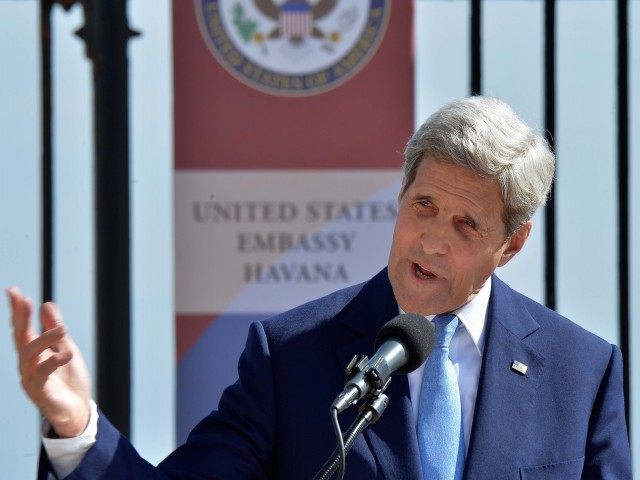(CNSNews.com) – The U.S. must call both Russia and Iran to account for “already violating” the nuclear agreement, House Foreign Affairs Committee Chairman Rep. Ed Royce (R-Calif.) said Thursday. He was responding to a reported trip to Moscow by Iran’s Qods force commander, who is subject to U.N. travel sanctions.
“[Maj. Gen. Qassem Soleimani] is the chief commander for Iranian foreign forces outside of Iran who carry out their assassinations and carry out their attacks,” Royce told CNN.
“And the fact that he would violate the sanctions prior to it being lifted upon him, by jumping the gun – this gives us the opportunity to call the Russians to account, and the Iranians to account, for already violating this agreement,” he said. “And we should do so.”
As a P5+1 partner, Russia – a U.N. Security Council permanent member -- is supposed to help enforce the nuclear agreement which the six powers negotiated with Tehran.
Following reports that Soleimani traveled to Moscow last month and met with President Vladimir Putin and Defense Minister Sergei Shoigu, Iran deal critics are asking: If Russia gets away with hosting him, what does that say about its likely response to any future Iranian cheating on the nuclear agreement?
Although the Obama administration agreed as part of the nuclear deal that U.N. sanctions against Soleimani and the Islamic Revolutionary Guard Corps (IRGC) Qods Force will be lifted, it says that will only happen in “phase two” of the agreement’s implementation – in about eight years’ time.
Any travel abroad by him ahead of that point would be in violation of the U.N. travel ban, under which all member states are required to deny him entry.
In a letter to President Obama, Royce has requested “a determination of whether the travel of Soleimani took place, its purpose, and whether it was in violation of United Nations sanctions.”
“Since the Iran agreement was signed, senior administration officials have testified that there would be no relaxing of sanctions against Iran for terrorist activity,” he wrote. “The reported free travel of Qassem Soleimani and the continuing arming of Iranian proxies throughout the Middle East is a direct challenge to that commitment.”
State Department spokesman John Kirby told a press briefing Thursday that Secretary of State John Kerry in a phone conversation with Foreign Minister Sergei Lavrov “raised concerns about the travel to Moscow by IRGC commander Qassem Soleimani.”
Later in the briefing, however, Kirby revised his wording, saying he could not independently confirm that the visit had indeed taken place, but that Kerry “has seen the reports of the travel and expressed his concerns [to Lavrov] about those reports.”
Fox News first reported on the alleged visit last week, citing unnamed Western intelligence sources.
Then Reuters reported that an “Iranian official, who declined to be identified,” confirmed that the trip had taken place, saying Soleimani had discussed “regional and bilateral issues and the delivery to Iran of S-300 surface-to-air missiles and other weapons.”
Russian state news agency RIA Novosti, however, quoted a Kremlin spokesman as denying the claim (although the report’s wording left open the possibility that the denial was specifically in relation to a Soleimani-Putin meeting, rather than about whether the visit took place at all.)
Soleimani’s name appears on a list of Iranian individuals and entities in line for sanctions relief, annexed to the nuclear agreement.
Hours after the deal was announced in Vienna on July 14, a senior administration official, briefing reporters on background, was asked about Soleimani’s inclusion.
“IRGC commander Qassem Soleimani will not be delisted at the United Nations at phase one; he will be delisted at the U.N. at phase two when the underlying designation authority terminates,” the official said.
That would only occur “after eight years into the deal, so sanctions are not being lifted early on Qassem Soleimani,” the official said.
Since then, Kerry has stressed that U.S. sanctions – as opposed to U.N. ones – against Soleimani will “never” be lifted.
Soleimani is accused of directing Shi’ite militias that carried out deadly attacks against U.S. troops in Iraq during the war there. According to the Joint Chiefs of Staff chairman nominee Gen. Joseph Dunford, he was responsible for the deaths of at least 500 U.S. soldiers and Marines in Iraq.









